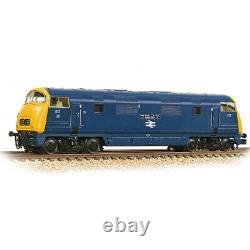Graham Farish 371-601B N Gauge Class 42 Warship 812'The Royal Naval Reserve 185


British Railways' (BR) Type 4 Warship class diesel-hydraulic locomotives were introduced in 1958, built at BR's Swindon works and numbered in the series D800 to D832 and from D866 to D870, eventually becoming British Rail Class 42. They were allocated to Bristol Bath Road, Plymouth Laira, Newton Abbot and Old Oak Common. The D800s were originally intended for the Paddington#Birmingham Snow Hill route and tests proved that their extra weight and power allowed them to run to a two-hour schedule with 368 tons in tow. However, the first service route for the class actually became Paddington#Penzance, either via Swindon and Bristol, or via Newbury and Westbury on the Berks and Hants route. This allowed for elimination of steam on the difficult-to-operate railway west of Newton Abbot. In October 1958 D800 became the first locomotive to take up the class's new diagram of the up Cornish Riviera Express (Penzance to Paddington), the 18:30 Paddington#Bristol and the 21:05 Bristol#Plymouth.
By 1964, the influx of both more powerful Western diesel-hydraulics and Class 47s drafted onto the WR, meant that some D800s were spared for use on the Waterloo-Exeter route and the former SR's Atlantic Coast Express, which worked beyond Exeter, and replacing it with a semi-fast Waterloo#Exeter service hauled by D800s. The late 1960s saw a revival in the fortunes of the D800s. In 1967 they moved onto the Paddington#Birmingham New Street route and in early 1968 Paddington#Hereford. Rising traffic levels on the Paddington#Plymouth route meant the WR aspired to an hourly service interval for this route with standard 10 and 12 carriage trains. The maximum schedule was to be 4 hours 15 minutes for the 225.5 mi (362.9 km), but the "Cornish Riviera Express" would be retimed for 3 hours 45 minutes with stops at Taunton and Exeter only.
The Class 52 Westerns could only cope with these timings on seven carriage trains. The answer was to assemble pairs of D800s and reinstate the multiple working equipment on them, to allow the pair to be controlled by one driver. This was done with D819/22#24/27#29/31/32 and D866#69.
Withdrawals commenced in 1968, with the pilot build trio withdrawn by early October, these being followed by three of the NBL Class 43s (D840/48/63) in 1969 and then the mass withdrawals of 1971 which saw the NBLs extinct by October. Several of the BR Class 42s soldiered on into 1972 and the last were withdrawn by the end of the year. Two Class 42s are preserved, D821 and D832. Or Telephone - 01242 523117.
This item is in the category "Collectables\Model Railways & Trains\Railways & Trains\Locomotives". The seller is "cheltenhammodels" and is located in this country: GB. This item can be shipped worldwide.
- MPN: 371-601B
- Era: Era 6: BR Pre TOPS 1967 - 1972
- Livery: BR Blue
- Brand: Graham Farish
- DCC Type: DCC Ready
- Scale: 1:148
- Gauge: N
- Type: Locomotives
- Loco Class: Class 42 Warship
- Decoder Version: 6 Pin
- Brand Collection/Range: Pre 2020
- UPC: 803393060893
- EAN: 0803393060893

